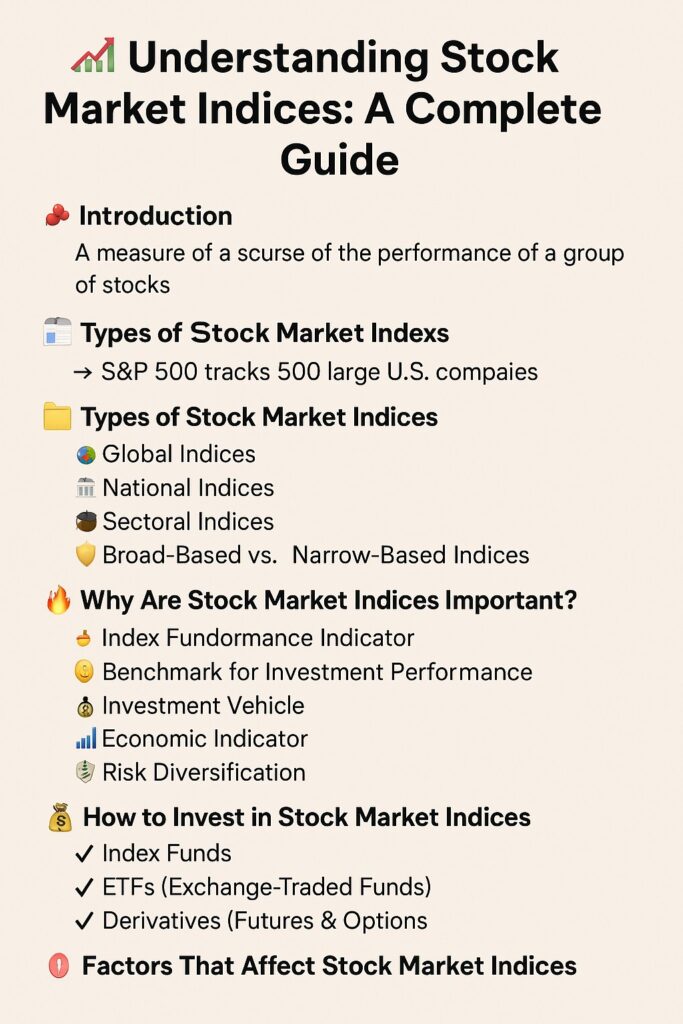📈 Understanding Stock Market Indices: A Complete Guide
📌 Introduction
Stock market indices are key indicators of the financial world. They help investors track market trends, assess economic health, and make informed investment decisions. Whether you’re a beginner or an experienced trader, understanding indices can give you a strategic edge.
This guide will cover:
✅ What stock market indices are
✅ How they work
✅ Their types and importance
✅ How to invest in them
Let’s dive in! 🚀

📊 What is a Stock Market Index?
A stock market index is a measure of the performance of a specific group of stocks. It provides insights into market movements and investor sentiment.
🔹 Example: The S&P 500 tracks 500 large U.S. companies, offering a snapshot of the U.S. stock market.
🔹 How it Works: Indices are calculated based on different methodologies, such as:
👉 Price-weighted: Stocks with higher prices have more influence (e.g., Dow Jones).
👉 Market-cap-weighted: Larger companies have a bigger impact (e.g., Nifty 50).
👉 Equal-weighted: All stocks hold equal weight, regardless of their price or market cap.
📂 Types of Stock Market Indices
Stock indices can be classified based on their scope and purpose. Let’s explore the major types:
🌎 1. Global Indices
These track stocks from multiple countries, giving a worldwide economic outlook.
🔹 MSCI World Index – Covers developed markets.
🔹 FTSE All-World Index – Tracks global stock performance.
🏦 2. National Indices
These represent a country’s stock market.
🇺🇸 S&P 500 (USA) – 500 large U.S. companies.
🇮🇳 Nifty 50 (India) – India’s top 50 firms.
🇬🇧 FTSE 100 (UK) – UK’s top 100 companies.
💼 3. Sectoral Indices
These focus on specific industries.
🔹 Nifty IT – India’s IT sector stocks.
🔹 S&P 500 Energy Index – Tracks energy stocks.
📌 4. Broad-Based vs. Narrow-Based Indices
✔ Broad-based indices – Cover a wide range of stocks (e.g., S&P 500).
✔ Narrow-based indices – Focus on specific sectors (e.g., NASDAQ-100 for tech).
🔥 Why Are Stock Market Indices Important?
Stock indices are crucial for investors, traders, and policymakers. Here’s why:
📢 Market Performance Indicator – They reflect overall market trends.
💰 Benchmark for Investment Performance – Investors compare returns against indices.
📊 Investment Vehicle – Index funds and ETFs allow investment in an index.
📈 Economic Indicator – Rising or falling indices indicate economic trends.
🛡 Risk Diversification – Investing in indices reduces stock-specific risks.
💰 How to Invest in Stock Market Indices?
You can invest in stock indices using:
✅ Index Funds – Mutual funds that mirror index performance.
✅ ETFs (Exchange-Traded Funds) – Trade like stocks but track indices.
✅ Derivatives (Futures & Options) – Used for hedging and speculation.
💡 Tip: Index funds and ETFs are great for beginners as they offer diversification with lower risk.
📉 Factors That Affect Stock Market Indices
Stock indices fluctuate due to various factors:
📊 Economic Indicators – GDP growth, inflation, and employment data impact markets.
💵 Corporate Earnings – Strong or weak earnings reports drive stock prices.
🌍 Global Events – Crises, wars, and pandemics cause volatility.
🏛 Government Policies – Tax policies, trade regulations, and interest rates affect indices.
😨 Investor Sentiment – Fear and greed drive stock prices.
🌟 Major Stock Market Indices Around the World
📍 United States
🇺🇸 S&P 500 – 500 top U.S. companies.
🇺🇸 Dow Jones Industrial Average (DJIA) – 30 major stocks.
🇺🇸 NASDAQ-100 – Tech-heavy index.
📍 India
🇮🇳 Nifty 50 – Top 50 companies on NSE.
🇮🇳 Sensex – 30 large-cap stocks on BSE.
📍 Europe
🇬🇧 FTSE 100 (UK) – 100 largest UK firms.
🇩🇪 DAX (Germany) – 40 top German companies.
📍 Asia
🇯🇵 Nikkei 225 (Japan) – Japan’s top stocks.
🇨🇳 Shanghai Composite (China) – Represents China’s stock market.
📊 Stock Market Index vs. Stock Exchange
Many people confuse stock indices with stock exchanges. Here’s the key difference:
🚀 How to Use Stock Market Indices for Investing?
Stock indices can guide investment decisions in several ways:
🔹 Passive Investing – Invest in index funds to match market returns.
🔹 Portfolio Diversification – Use sectoral indices for diversification.
🔹 Market Trend Analysis – Track indices to identify market direction.
🔹 Economic Forecasting – Use indices as an economic indicator.
💡 Pro Tip: If you are new to investing, start with an index fund like the Nifty 50 ETF or S&P 500 ETF for stable long-term growth.
🔚 Conclusion
Stock market indices are essential tools for investors and traders. They help track market trends, assess economic conditions, and guide investment strategies. Whether you are a beginner or an experienced investor, keeping an eye on indices will help you stay ahead in the financial markets.
By understanding stock indices and how they work, you can make better investment decisions and grow your wealth over time. 🚀💰
❓ FAQs
Q1. What is the most important stock market index?
➡ The S&P 500 is widely considered a key global market indicator.
Q2. Can I invest in stock market indices directly?
➡ No, but you can invest through index funds, ETFs, and futures contracts.
Q3. Why do stock market indices fluctuate?
➡ Economic conditions, corporate earnings, global events, and investor sentiment drive index movements.
Q4. Which is better: investing in individual stocks or index funds?
➡ Index funds offer lower risk and diversification, while individual stocks may provide higher returns but with greater risk.
📢 Final Tip: If you’re looking for a long-term investment with lower risk, index funds and ETFs are a great way to start!
🔔 Stay informed, invest wisely, and grow your wealth! Start your investing journey with wealth wired






